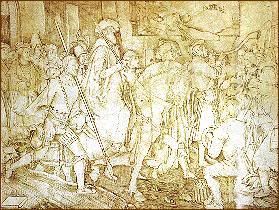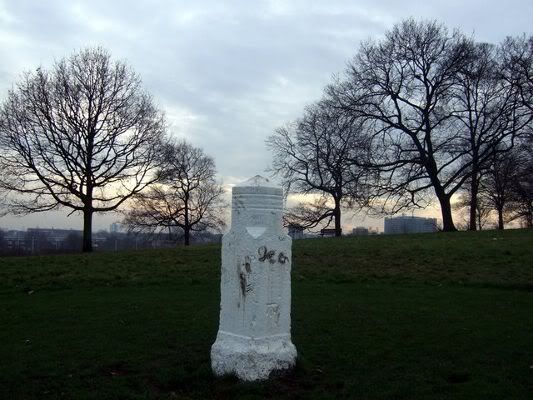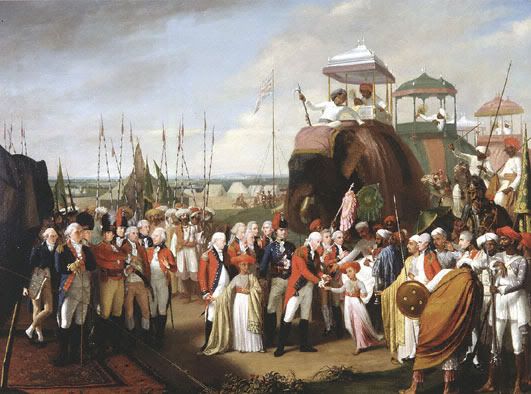[Kurt: Three centuries and two updates, including this one. Of course, there's more to come after that, I have to give a tour of Britain and the world.  ]
]
The England that Henry Stafford - now Henry II - came to rule over was surprisingly well-off for one that had recently gone through three decades of civil war. The fighting had mostly involved the nobility, and even then only on-and-off; of the lands belonging to the English monarch, only the peripheral lands of Iceland and the Greek Isles remained permanently sundered by the chaos. Henry's main task was to ensure a stable administration, a task he quickly and competently set to. Henry practically broke the power of the nobility, and turned England's focus back away from the Continent and to the sea. It was under Henry that the first expeditions were sent to America, and settlements soon followed these explorers.
Henry's son Edward VI was a decidedly uninspiring ruler; he did little in England during his short reign aside from letting his authority drift to the Privy Council and back to the nobility to some extent. In America, however, the famed Ethelred Harcourt began his great expeditions up and down the coastline that would eventually become the heartland of British America, founding the important centres of New Lothian and Nova Scotia along with their main cities of Norfolk and Port Royal. It was Edward's son Henry III who would prove the more engaged monarch - and the more momentous one. Lutheranism had grown more and more common underground in England, despite the work of Sir Thomas More, and combined with a royal argument with the Pope this resulted in Henry deciding to make the Church of England independent from Rome.

Agents of Thomas Cromwell leaving a destroyed monastery (1530s)
Henry quickly moved to integrated England into the grow Protestant world of the time. He personally entered into sequential marriage alliances with the two most powerful Protestant countries on the continent, the Kingdom of Baden and the Commonwelath of Poland and Lithuania. Although he was uncertain about changing the theological content of the newly-independent church at first, the influence of more radical reformers in England, along with his final wife Salome, resulted in the nature of Anglicanism slowly drifting during the middle of the 16th century. Combined with persecution under Henry's very Catholic daughter, Mary I, the true break with Catholic tradition had been made. Soon, even more radical groups, in particular the Puritans, appeared in England and tried to assert themselves in the face of opposition from both Catholics and Anglicans.
Religious tensions, both domestic and foreign, boiled over entirely during the reign of Elisabeth I. The northern parts of the Netherlands were lost early on, and soon Catholics througout Britain itself - in particular in Kent, the Scottish Highlands, and Ireland - made constant bids to replace the Protestant leadership of their country with a Catholic one. These times of unrest resulted in the Catholics involved calling upon the foreign power that would most famously attempt to reinstate Catholicism in England - Philipp III of Spain, whose "Invincible Armada" sailed for England in the late 1580s. Skilled assaults by English ships and poor luck with weather, however, resulted in the fleet being sunk, and by the end of Elisabeth's reign the Catholic threat had ended, though the persecution of them did not.
Said time was, however, also the end of the Stafford dynasty. Henry III's inability to have a male heir brought a new family to the throne of the newly-created Empire of Great Britain: the same Borcalans who had taken such a large role in the late Siwarding period, now Dukes of Lothian, the main noble family in Scotland, and fully integrated into British culture. The Borcalans began well, but even in the reign of the first one, James, it was becoming apparent that the power of the Imperial title was starting to go to his head. Once his son Charles became Emperor in 1625, things unravelled for the Borcalan dynasty entirely.
Not merely absolutist, Charles was that worst thing a ruler could be: arbritrary. His switching back-and-forth with Parliament as to whether he intended to rule with their input or not quickly raised their ire, culminating in the Helvetian War of 1639. Although the war was a successful one for Charles and the British - Badish alliance that was arrayed against France, the expense forced Charles to deal with Parliament in order to pay for it. Parliament responded to the moment of weakness on Charles' part to order the execution of a hated second-in-command of his who had committed crimes in office; when Charles sought to arrest Parliamentary leaders for this, Parliament quickly rose up against him - as did much of the country. The English Civil War that followed was short and bloody, and ended with the death of Charles late in 1642. The Commonwealth had come, and although the monarchy would return, the power of the Emperor had been limited for good.
The England that Henry Stafford - now Henry II - came to rule over was surprisingly well-off for one that had recently gone through three decades of civil war. The fighting had mostly involved the nobility, and even then only on-and-off; of the lands belonging to the English monarch, only the peripheral lands of Iceland and the Greek Isles remained permanently sundered by the chaos. Henry's main task was to ensure a stable administration, a task he quickly and competently set to. Henry practically broke the power of the nobility, and turned England's focus back away from the Continent and to the sea. It was under Henry that the first expeditions were sent to America, and settlements soon followed these explorers.
Henry's son Edward VI was a decidedly uninspiring ruler; he did little in England during his short reign aside from letting his authority drift to the Privy Council and back to the nobility to some extent. In America, however, the famed Ethelred Harcourt began his great expeditions up and down the coastline that would eventually become the heartland of British America, founding the important centres of New Lothian and Nova Scotia along with their main cities of Norfolk and Port Royal. It was Edward's son Henry III who would prove the more engaged monarch - and the more momentous one. Lutheranism had grown more and more common underground in England, despite the work of Sir Thomas More, and combined with a royal argument with the Pope this resulted in Henry deciding to make the Church of England independent from Rome.

Agents of Thomas Cromwell leaving a destroyed monastery (1530s)
Henry quickly moved to integrated England into the grow Protestant world of the time. He personally entered into sequential marriage alliances with the two most powerful Protestant countries on the continent, the Kingdom of Baden and the Commonwelath of Poland and Lithuania. Although he was uncertain about changing the theological content of the newly-independent church at first, the influence of more radical reformers in England, along with his final wife Salome, resulted in the nature of Anglicanism slowly drifting during the middle of the 16th century. Combined with persecution under Henry's very Catholic daughter, Mary I, the true break with Catholic tradition had been made. Soon, even more radical groups, in particular the Puritans, appeared in England and tried to assert themselves in the face of opposition from both Catholics and Anglicans.
Religious tensions, both domestic and foreign, boiled over entirely during the reign of Elisabeth I. The northern parts of the Netherlands were lost early on, and soon Catholics througout Britain itself - in particular in Kent, the Scottish Highlands, and Ireland - made constant bids to replace the Protestant leadership of their country with a Catholic one. These times of unrest resulted in the Catholics involved calling upon the foreign power that would most famously attempt to reinstate Catholicism in England - Philipp III of Spain, whose "Invincible Armada" sailed for England in the late 1580s. Skilled assaults by English ships and poor luck with weather, however, resulted in the fleet being sunk, and by the end of Elisabeth's reign the Catholic threat had ended, though the persecution of them did not.
Said time was, however, also the end of the Stafford dynasty. Henry III's inability to have a male heir brought a new family to the throne of the newly-created Empire of Great Britain: the same Borcalans who had taken such a large role in the late Siwarding period, now Dukes of Lothian, the main noble family in Scotland, and fully integrated into British culture. The Borcalans began well, but even in the reign of the first one, James, it was becoming apparent that the power of the Imperial title was starting to go to his head. Once his son Charles became Emperor in 1625, things unravelled for the Borcalan dynasty entirely.
Not merely absolutist, Charles was that worst thing a ruler could be: arbritrary. His switching back-and-forth with Parliament as to whether he intended to rule with their input or not quickly raised their ire, culminating in the Helvetian War of 1639. Although the war was a successful one for Charles and the British - Badish alliance that was arrayed against France, the expense forced Charles to deal with Parliament in order to pay for it. Parliament responded to the moment of weakness on Charles' part to order the execution of a hated second-in-command of his who had committed crimes in office; when Charles sought to arrest Parliamentary leaders for this, Parliament quickly rose up against him - as did much of the country. The English Civil War that followed was short and bloody, and ended with the death of Charles late in 1642. The Commonwealth had come, and although the monarchy would return, the power of the Emperor had been limited for good.



